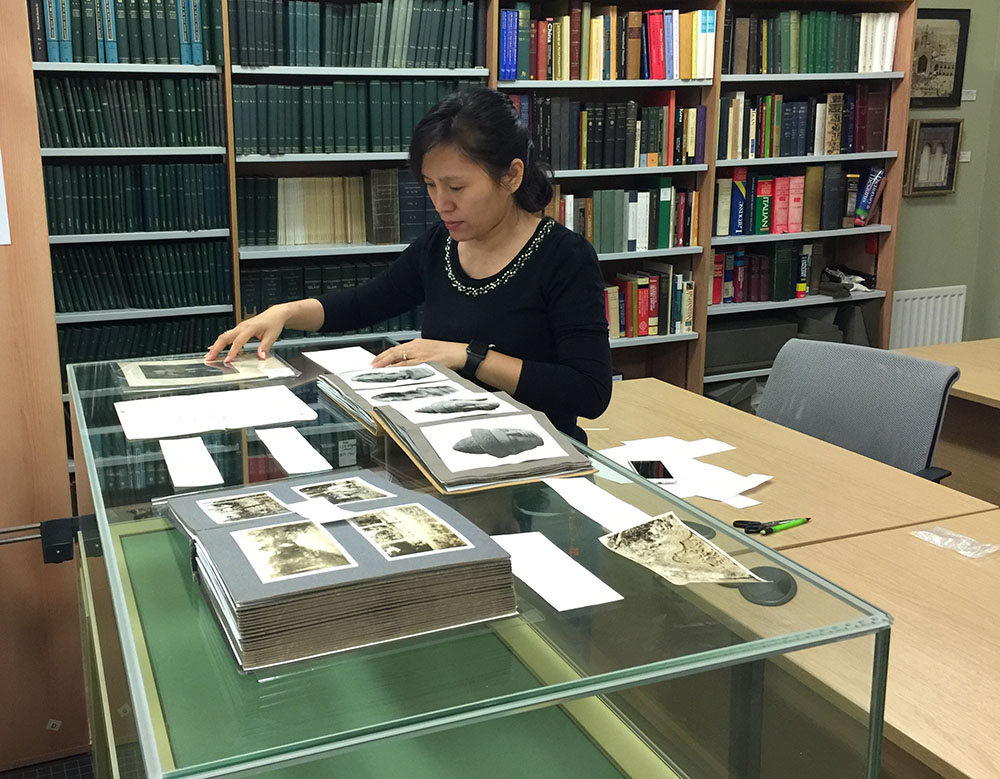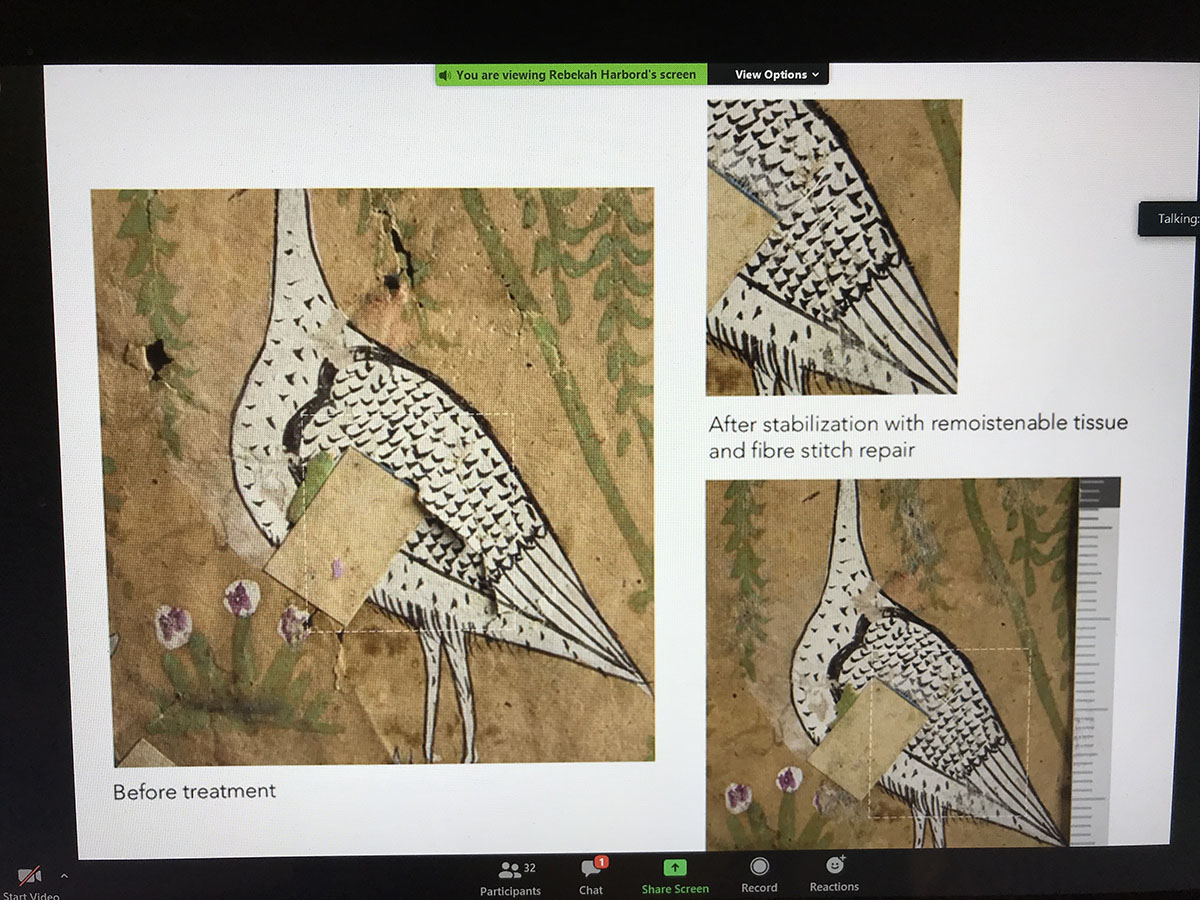Presenting the first virtual collections evening
On Wednesday 25th November, we held our first virtual collections evening over Zoom. This was originally billed to take place in March but was cancelled due to the first lockdown. We were delighted that each of the three speakers originally scheduled could join us to discuss their work with RAS collections. The evening provided a fantastic opportunity to learn about the diverse projects each presenter had carried out, helping conserve collections and making them more accessible to researchers.
Sonetra Seng
We were thrilled that our first presenter, Sonetra Seng, could join us all the way from Cambodia. Sonetra explained her work with the Society’s H.G. Quaritch Wales collection of photographs, objects, and archives, documenting Hindu and Buddhist antiquities in South East Asia. Sonetra completed this project during her time at the Society last year as an Alphawood scholar, after finishing an MA in History of Art and Archaeology at SOAS. Sonetra’s internship at the RAS focused especially on the trips that Quaritch Wales had taken to Cambodia in 1926 and 1933. Sonetra spoke about the diversity of material that she had encountered within this collection, which included hundreds of glass slides and loose photographs, books, articles, and two handwritten journals. As part of her placement Sonetra listed, catalogued and re-packaged this material. She also spoke about preparing a small exhibition in the RAS Reading Room highlighting the material that Quaritch Wales had collected during his time in Cambodia. Sonetra is now taking her passion for art history and archaeology to the next stage, and is completing a PhD at SOAS.

Arantza Dobbels
Arantza spoke about her experience conserving four maps of the sacred island of Sivasamudram in India, dating from 1830. This project was part of her MA in Paper Conservation at Camberwell College of Arts. The maps were in a fragile condition, suffering extensive surface dirt and water damage which had resulted in discoloration and tears. Arantza spoke about her methodology in handling these conservation issues. She first produced a condition report which assessed the types of paper and other material used, as well as the types of obvious damage, before deciding on appropriate and realistic objectives for the project. One of the primary challenges was how to deal with an ownership stamp that had been placed on the maps: the “fugitive” (water-sensitive) ink meant she would not be able to wash the maps as she had originally intended. Arantza spoke about other ways in which she treated these maps, which included: surface cleaning with a smoke sponge, the humidification of the maps to flatten out creases, and repairing tears with fine tissue. To allow these maps to be accessible to researchers and prevent further damage, Arantza produced new bespoke folders so they could be stored appropriately. Since graduating, Arantza has taken up a post as Project Conservator at the National Archives.

Rebekah Harbord
Rebekah also completed an MA in Paper Conservation at Camberwell College of Arts, and spoke about the conservation work she had undertaken of fragile Indo-Persian miniature paintings of Laylá and Majnūn, previously believed to date from the mid- sixteenth to mid- seventeenth century. There were several conservation issues with these paintings, which included creasing and damage at the spine edge as well as general pigment abrasion and loss. As the provenance of these works is unknown, Rebekah described her efforts to examine the colour pigments, which suggested a later date of creation and helped inform the most appropriate conservation treatment. This also tied in with ethical challenges that Rebekah encountered in deciding whether to remove the historical repairs that had already been carried out on the works. As similar works from the time had kept such historic repairs, Rebekah deemed it appropriate to maintain these as part of the past life of these artworks. Rebekah also showcased the types of treatments that she used on the paintings. As there were issues with moisture, she controlled this through the usage of a specialised gel. To make these works accessible to researchers, she remounted the works on anti-static acrylic and made a special custom portfolio for ease of handling and access. Rebekah has also taken up a post at the National Archives and is now working as a Project Conservator with the Digitisation team.

We would like to thank our three presenters for their presentations, for the fantastic projects that they have carried out at the Society, and to wish them the best of luck in their future roles.
With all the interruptions to the Society’s activities this year, it was a great pleasure to be able to revisit and celebrate some of the wonderful work that has been done with the Society’s historic collections. Under normal circumstances, the Society welcomes a steady stream of scholars and enthusiasts to our Reading Room, to examine collections which have a major impact on academic research and inspiring cultural creativity more widely. For many years now, we have also hosted a vibrant voluntary programme, working with numerous placement students and volunteers who have done wonderful work to conserve, catalogue, and interpret our collections. Many of them have spoken on previous Collections Evenings. While this work has been unfortunately suspended for much of this year, the Collections Evening was a great reminder both of what has already been achieved, and what we hope to do once more when the external situation improves.
Event recordings now on YouTube!
For those of you who have been unable to attend some of our virtual events, we have now started to upload some recordings of these onto the Society’s YouTube page. These can be viewed at: https://www.youtube.com/channel/UCXi0hS5mxNzy7icPV485FfQ/videos
More will be added in the coming weeks and months.
Update on the reading room service
With the Government announcing that London is to move into tier 2 restrictions, we are pleased to announce that we will be re-opening our reading room service for one day a week every Thursday from Thursday 3rd December to Thursday 17th December. Readers will need to book in advance by either emailing the Librarian Edward Weech at ew@royalasiaticsociety.org or the Archivist Emma Jones at ej@royalasiaticsociety.org.
